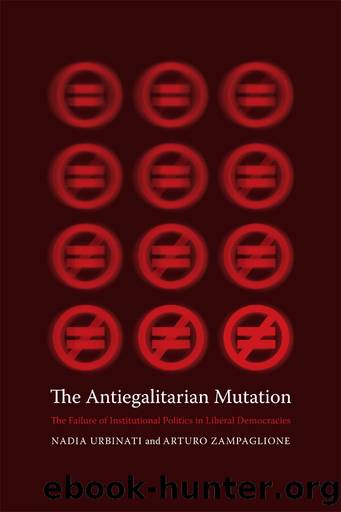The Antiegalitarian Mutation: The Failure of Institutional Politics in Liberal Democracies by Nadia Urbinati & Arturo Zampaglione

Author:Nadia Urbinati & Arturo Zampaglione [Urbinati, Nadia & Zampaglione, Arturo]
Language: eng
Format: epub
ISBN: 9780231169844
Google: iwfjjwEACAAJ
Amazon: B01I8S3ZO8
Barnesnoble: B01I8S3ZO8
Goodreads: 43822856
Publisher: Columbia University Press
Published: 2016-01-15T06:24:57+00:00
4
The âFewâ and the âManyâ
Q. In recent decades the gap between rich and poor has grown steadily throughout the world. According to the data from the OECD, in 2008 the average income of the richest 10 percent of Italians was ten times higher than that of the poorest 10 percent. From 2011 onward Occupy Wall Street and the protests in so many other cities have denounced the growing imbalance between the 1 percent of the wealthiest classes and the remaining 99 percent of the population. What effect is this dynamic likely to have on the health of our democracies?
A. With the eruption of a spontaneous and spectacular movement in the heart of global financial capitalism, one that has deliberately remained leaderless, Occupy Wall Street has highlighted a question that has come to the fore in the last two decades, even if it has really only flared up with the eruption of the economic crisis in 2008. At issue today is the maintenance of the compromise between oligarchy and democracy. Or, to put it another way, what is in doubt is the readiness of the few, or the very few, to remain part of a society that is governed through the votes of everyone and in which, moreover, more and more people are increasingly in need of help because of their impoverishment.
Q. Wait a minute. How do you define oligarchy?
A. I will answer by referring to a book entitled Oligarchy, written by Jeffrey Winter. Oligarchy, Winter explains, consists of a concentration of material wealth (concrete possessions) that resists policies of redistribution. It is not simply a group with far-reaching power or an elite, this latter being a term that refers to the selection of a political class, not an oligarchy. It has to do rather with persons who possess extraordinary material wealth and who do not necessarily seek a political role, being able to live under any and every regime. Their primary objective is to protect and increase their wealth. It is not an interest in some future project that spurs them on but the safeguarding (which also means the expansion) of an economic power that they already have. And it is in the light of this power that oligarchies decide whether to abstain from or intervene in the political game. History shows that the advent of a democratic regime has never involved the elimination of the holders of wealth, nor even the expropriation of excessive fortunes. It has, however, involved their being deprived of the privilege of selecting those who make decisions or making political decisions directly. Democracy distributes this power among the large majority of the population by means of universal suffrage. On the other hand, democracy does not presuppose or seek economic equality, nor an equal distribution of property, nor the abolition of private property. Democracy is a political system, not an economic one; it is a system that consists precisely of distributing among all adult citizens the fundamental right to participate in power and to make decisions in a direct or indirect fashion.
Download
This site does not store any files on its server. We only index and link to content provided by other sites. Please contact the content providers to delete copyright contents if any and email us, we'll remove relevant links or contents immediately.
| Comparative | Conflict of Laws |
| Customary | Gender & the Law |
| Judicial System | Jurisprudence |
| Natural Law | Non-US Legal Systems |
| Science & Technology |
American Kingpin by Nick Bilton(3876)
Future Crimes by Marc Goodman(3594)
The Meaning of the Library by unknow(2565)
Inside the Middle East by Avi Melamed(2352)
Why Nations Fail: The Origins of Power, Prosperity, and Poverty by Daron Acemoglu & James Robinson(2289)
On Tyranny by Timothy Snyder(2227)
Living Silence in Burma by Christina Fink(2068)
Putin's Labyrinth(2017)
The Mastermind by Evan Ratliff(1934)
The Smartest Kids in the World by Amanda Ripley(1855)
Think Like a Rocket Scientist by Ozan Varol(1815)
Law: A Very Short Introduction by Raymond Wacks(1738)
It's Our Turn to Eat by Michela Wrong(1728)
The Rule of Law by Bingham Tom(1690)
Philosophy of law a very short introduction by Raymond Wacks(1667)
Leadership by Doris Kearns Goodwin(1634)
A Dirty War by Anna Politkovskaya(1627)
Information and Communications Security by Jianying Zhou & Xiapu Luo & Qingni Shen & Zhen Xu(1617)
Civil Procedure (Aspen Casebooks) by Stephen C. Yeazell(1554)
